I grew up in northern Michigan, which meant I grew up swimming and sailing in Lake Michigan. It was basically our playground. So I was delighted to learn that the breakout hit that this year’s Sundance Film Festival wasn’t just directed by a fellow Michigander, but featured all the beloved tropes from my youth.
It’s called “Sunfish (& Other Stories on Green Lake)”, and even if you didn’t make it to the festival this year in Park City, you can still catch a screening of the film online today or next Monday. Go here for details.
I haven’t watched it yet, but I assume it’s gonna be a ginormous hit, doing massive box office numbers and maybe nabbing a few Oscar nominations. And that it’ll just open the floodgates for more stories about Midwestern kids having Moby Dick-lite adventures on the Great Lakes. So I offer you this tale of two brothers and a Sunfish, which is available for novel adaptations and/or screenplay options.
My brother and I flipped the boat, because flipping the boat is what we do.
It’s been a summer tradition for us almost as long as we've been sailing. And by "we" I mean my brother. I don’t sail. I’m just a passenger, and I’m perfectly content with this inactive role.
I’ve learned a few basic sailing terms over the years—“luffing” and “starboard tack” and “gybe”—but those are just for my own protection. My brother, while entirely harmless on dry land, turns into Moe Howard when we’re out on the lake. I’ve learned the hard way that when he shouts “hard-alee,” it means the boat is changing directions and I need to duck immediately or get pimp-slapped by the boom—a bit of vaudeville theater he finds endlessly amusing.
It's a small boat, a two-seater Sunfish, so it doesn't take much to capsize. One strong gust of wind and it's on its back quicker than a Florida middle school teacher after a shot of Jäger. Back when we were teenagers, we had our boat-dumping act down to a science. My brother was so good that he could flip a boat and then get it righted again without ever getting wet. It had something to do with climbing across the boat as it went under, like a lumberjack in a log rolling contest, and then pulling down hard on the centerboard.
For my part, my only job was to jump when he said jump, and then float in the water while he did his thing.
We didn't do it just for our own amusement. We were usually showing off. I knew a dunk was about to happen when my brother looked at me and muttered, “You wanna freak these guys out?” That was code for, “There’s another boat nearby. Let’s trick them into thinking we’re in trouble, and then show these bitches how it’s done.”
Again, the “we” in this sentence could be misleading. I was not in any way a vital part of the nautical medicine show. I was not the Robin to my brother’s Batman. I was Alfred, standing near the back and saying, “Very good, sir.”
My brother enjoyed teasing me about my inability to be a productive member of his aquatic kingdom. “What would you do if I fell out of the boat right now?” he liked to ask me.
My answer was always the same. I'd jump in after him. This made him howl in protest, and he’d remind me that the boat would likely continue on without us, eventually disappearing into Lake Michigan. Wouldn’t I at least try to steer it back to shore?
“No,” I’d tell him. “You jump, I jump.”
I wasn’t trying to be cute. I was serious. The captain goes down with the ship, and there was no fucking way I was the captain. He sometimes tried to test me, pretending to make a dive for the water. But I always called his bluff. In his gut, he knew that I’d sacrifice the boat, which had given us almost three decades of cherished summer memories, before I’d even consider trying to figure out what a rudder does.
But that didn’t mean I was completely uninvolved. There were certain theatrics required in recreating a realistic boating accident and inspiring genuine panic from the terrified onlookers. It wasn’t just a matter of catching the right wind and letting gravity do the rest. It needed drama.
Sometimes a well-placed scream would do the trick. When we really wanted to sell it, we'd cook up an elaborate backstory. It began with some in-fighting; we’d yell a few insults at each other when another boater was within earshot. And before long, it devolved into a full-on slugfest, with exaggerated punching and wild gestures that even the sunbathers watching from the beach couldn’t miss.
But even at our cruelest, we never cried out for help. That would’ve been wrong. We didn't want to take advantage of any good samaritans. And we sure as hell didn't want any of them calling the Coast Guard before we revealed the punchline. We just wanted to make them feel like idiots. We wanted to look at them and say, “Wait, you thought we didn't mean to capsize? Oh man, that is priceless! Hahahahahaha!”
Sometimes out intentions were less innocent. Our “accidents” were often conveniently timed with the passing of a boat filled with college girls clad in skimpy bikinis. They were easy enough to scare, especially as most of them were drunk and their idea of sailing began and ended with turning the ignition key. When my brother saved our vessel from certain tragedy, like some tanned Houdini, the girls would burst into applause, giving him a standing ovation and rewarding his efforts with catcalls and crude (if much appreciated) compliments about his ass.
We never discussed it, but I think we always hoped it would lead to something. After performing our stunt show for dozens of seafaring coeds, it never resulted in one of them saying, “Hey, how would you boys like to come aboard and let us treat you to a leisurely afternoon of beer and handjobs?” Not once.
It may've been my fault. I was, for all intents and purposes, my brother's wingman. I could've made more of a fuss. I could've said, “Wow, did you see what that guy just did? Pretty amazing, huh? And I'm not just saying that because I'm his older brother. You think I could do the same thing? I've been on boats my entire life, and my only discernable skills are wearing a lifejacket and floating in the lake like an aborted fetus in a jar of formaldehyde.”
I do find it curious that my brother became such a sailing enthusiast and I never developed even a modicum of interest in it. Sailing is in our blood. Our father loved it, or rather, he liked the idea of loving it. He actually hated everything about the actual act of sailing. But he didn't discover that until after he’d spent our savings on a boat, big enough for all four of us and a few guests.
He was determined to make our weekends on Lake Michigan a meaningful and joyous family experience. But after we’d get just a few yards off shore, he’d fall apart. He didn’t understand how a boat worked. It confused and frustrated him. He didn’t know the difference between windward and leeward, a mainsheet and a jib, and it made the vein on his forehead throb angrily. But the rage was soon replaced with abject fear. He was convinced that something terrible was going to happen, probably due to his utter incompetence, and we would end up sinking to our watery graves.
Also—and I never really understood why this happened—a day on our boat meant that we were probably going to see our father's balls.
Or at least one of them.
I don't think he meant to expose himself, but invariably he'd wear shorts that rode up just a little too high, and one ball would come squeezing out of the side, like a children's birthday balloon that'd been blown up by an asthmatic. It was hypnotic. We didn’t want to look at it, but we couldn’t look away. Even cries of “Dad, we can see your balls” didn't make it go away. He never listened to us and tucked his stray ball back into his shorts, like any reasonable person might do. His attention was fixed on the sea, wondering if there was something he could do to stop all that water from flooding over the bow.
Out of necessity, my mother learned the basics of operating a boat. And my brother is convinced that he also learned how to sail because of the trauma of those childhood boat journeys. I believe I didn't learn how to sail for the very same reason. On an unconscious level, he wanted to save our father. I just wanted off the boat. My every memory of sailing involves my father screaming, “Where's the cleat? I don’t even know what a goddamn cleat looks like! Oh my sweet lord, we're all going to die!”
And then a few hours later, when we’d docked the boat and managed to get my dad enough oxygen to stop hyperventilating, we’d be sitting in our backyard and he’d be sipping on a beer and he’d look at the family with a big smile and say, “Today was fun, don’t you think?”
But I learned to love it again when my brother became the sailor my father never was. It was comforting to know that he was in control, and that I could jump off the boat and abandon him in an emergency. It was a freedom that I didn't have in my everyday life; the ability to stand up at any moment and announce, “I’m outta here,” and then just fling myself into the abyss, watching as everything drifts out of view.
When my brother took up sailing, my parents decided that they didn’t need to be the mariners of the family anymore. So they retired and became our audience. They even joined a nearby yacht club so we’d have beachfront access. It was an ironically-named organization, given that none of the members had ever set foot on a yacht. They were mostly tourists from Chicago or Detroit who spent their summers in lakeside cottages and hosted potlucks while wearing captains’ hats and drinking cocktails with names like “Hold The Tonic.”
They did sail occasionally, and like us, they sailed Sunfishes. But they preferred to wait until the wind was at its most dangerous, and their frontal lobes had been soaked in enough $3 scotch to permanently impair their “fight or flee” response.
Even with so much competition, we still managed to be the black sheep of the yacht club. We were the ones terrorizing the waters with our immature antics, like pirates more prone to self-effacing tomfoolery than plundering and rape. It wasn’t enough just to catch a strong breeze and ride it out. We wanted adventure. We wanted to sail dangerously close to the kayakers, who would curse at us like senior citizens protecting their lawns.
We coaxed our younger cousins onto the boat with us and delighted them with increasingly ill-advised stunts, which usually meant throwing me overboard and running me down at frightening speeds. I’m surprised sometimes that I still have all of my original teeth.
We also plotted trips to Gull Island, a once idyllic oasis that was now infested with seagulls, who launched their white crap at visitors like Japanese kamikaze bombers. But the journey was daunting. At the start of every summer, my brother hopefully surmised that it'd take us “an hour or so” to get to the island. By early July, he estimated that it would require “most of the morning,” and by August it became “a weekend trip.” I never understood how an island could get further and further away in just a few months, but I suppose it has something to do with global warming.
In recent years, I'm more aware than ever of these missed opportunities. We still take the boat out every summer, and we still laugh like sun-drunk adolescents. But we don’t capsize nearly as often as we used to. The old girl is showing signs of age, and it’s shocking that she's endured so much abuse by our hands and still comes back for more. She still sails with the best of them, but she isn’t the prettiest girl at the prom. She’s covered in scratches and rust and loose screws.
And our boat isn't the only one getting older. Sailing—or, as the case may be with me, sitting—takes a little more effort than it used to, and the aches and bruises incurred by dragging my middle-aged body onto a Sunfish—which, I never noticed before, has a lot of sharp edges—just reminds me yet again that I’m not a kid anymore. And I don't need that wake-up call. I still want to enjoy the comforting illusion that the best is still in front of me.
I’ve always been more of a floater anyway. Sailing is all well and fine, but there's nothing quite like diving off of a moving sailboat and just letting your body go limp. I don't know why I like it so much. Sometimes, as I’m bobbing in the water, I catch myself thinking, “Well, if I have to go now, this would be the perfect time to have a heart attack.”
Is that weird? It sounds weird.
Maybe these kind of dark thoughts only occur to people who've lost a parent to a heart attack. It's something you think about all the time. It’s not like cancer, which you can see coming. You have to constantly anticipate a heart attack, looking for it around every corner. For the rest of your life, you're gonna live with the question: “Can I afford to die right here, right now?”
When my father died, my mom found him in the kitchen. He was lying on the floor, reaching for the phone, a half-eaten sandwich on the table. I don't even want to think about what kind of mess was involved. From what little I've read on the subject, your body pretty much lets go when you die. Piss and shit and every other bodily fluid that isn’t needed anymore makes a run for the exit. But if you die in water, there’s no danger that you’ll be discovered lying face down in a pool of your filth. Everything just... washes away.
I’ve had friends tell me that I love water because I’m a Pisces. But I think I love water because it’s the cleanest way to die.
“You wanna freak these guys out?”
I look up at my brother. “Freak who out?” I ask.
He gestures towards the shore a half-mile away, where a small smattering of boats are just barely visible. We've heard rumors that a race was planned today. It was the only reason we'd come out so early. The last time the yacht club sponsored an actual sailing contest was almost ten years ago, and we were beginning to worry that the new generation of summer tourists lack a fighting spirit. Sure, they have an enthusiasm for alcoholic beverages to match their forefathers, but it takes a certain special something to aim a 13-foot fiberglass dagger into hostile waters while mixing yourself another gimlet.
As we get closer, we both have the same horrifying realization. Those tiny boats in the distance, chasing each other in tight circles? They're... well, not much bigger than they appear. They aren't even real boats. They're motorized and miniature toys, controlled by their owners from the relative safety of the beach. This isn't a race, it's a facade! It's gathering of nerd hobbyists who have about as much to do with actual sailing as a ComiCon attendee has to do with space travel.
I look back at my brother and notice a wicked grin on his face. We exchange smiles and I perch on the edge of the boat, ready to make a leap into the chilly Michigan waters. But he waves me back, indicating that he has no intention of capsizing. He has something else in mind.
The wind has been manic depressive all morning, shifting between strong gusts and miserable sighs, like a bipolar patient off his meds. But as if some divine presence has decided to intervene on our behalf, we suddenly catch a breeze that sends us flying across the lake like we’ve been flung from a catapult. There’s no stopping us.
We hear screams echoing from the beach. “You’re too close,” they yell at us, waving their arms frantically. “Too close!”
My brother doesn’t flinch. He just stares at his target. Like me, he’s curious to see if we’ll actually go through with it.
“Say when,” he offers without looking at me.
I say nothing. I assume we’ll change tack at the last possible second, but I don’t want to be the one to chicken out first. Too much is at stake. It feels like a pivotal moment. We’re at a crossroads, stuck between the immaturity of our youth and some boring future of responsible adulthood.
“Say when,” my brother says again, the panic rising in his voice. The screams from the beach are now almost deafening. The boats flee in every direction, like tiny Japanese businessmen in a Godzilla movie.
“Just a little more,” I whisper, so excited I can't even blink. “A liiiiiittle more.”






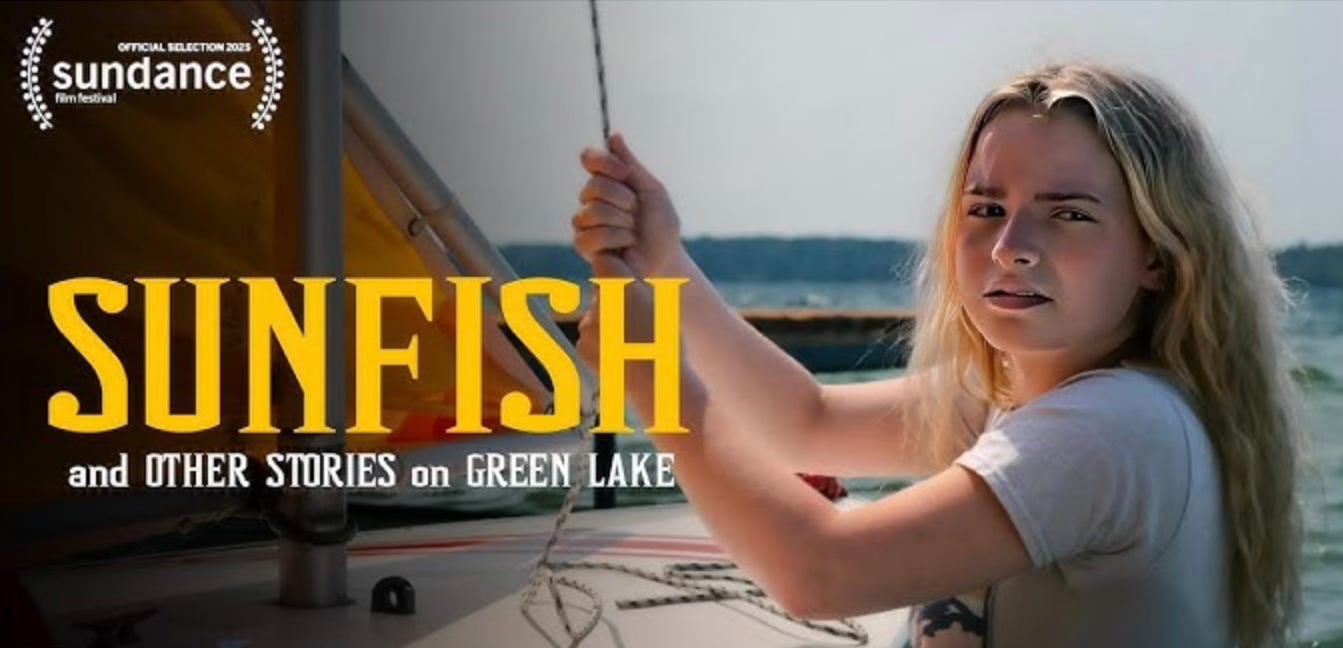
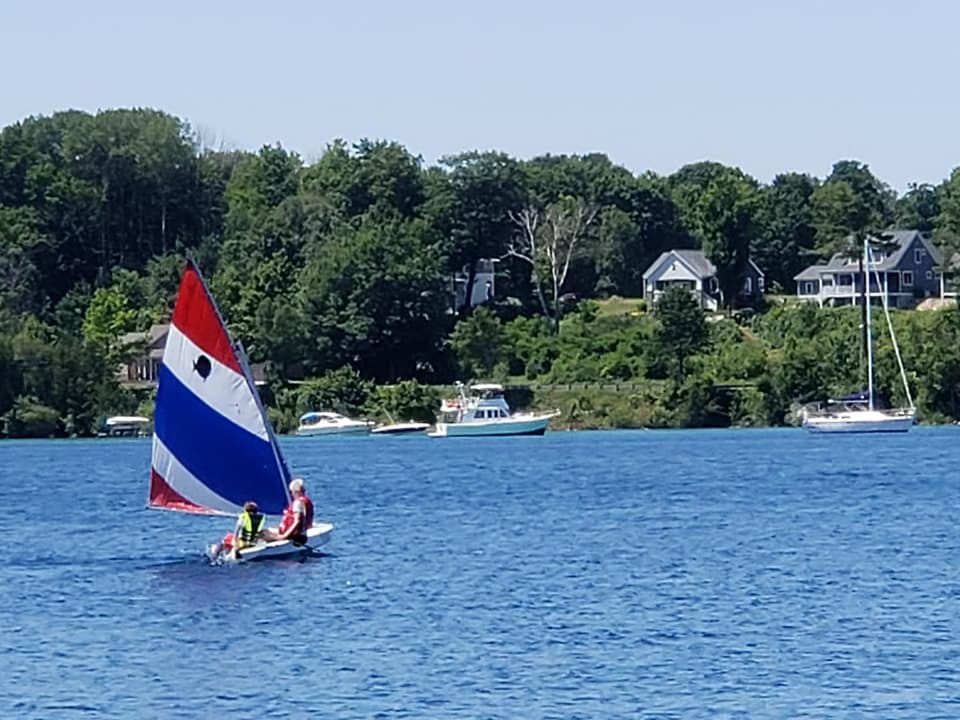
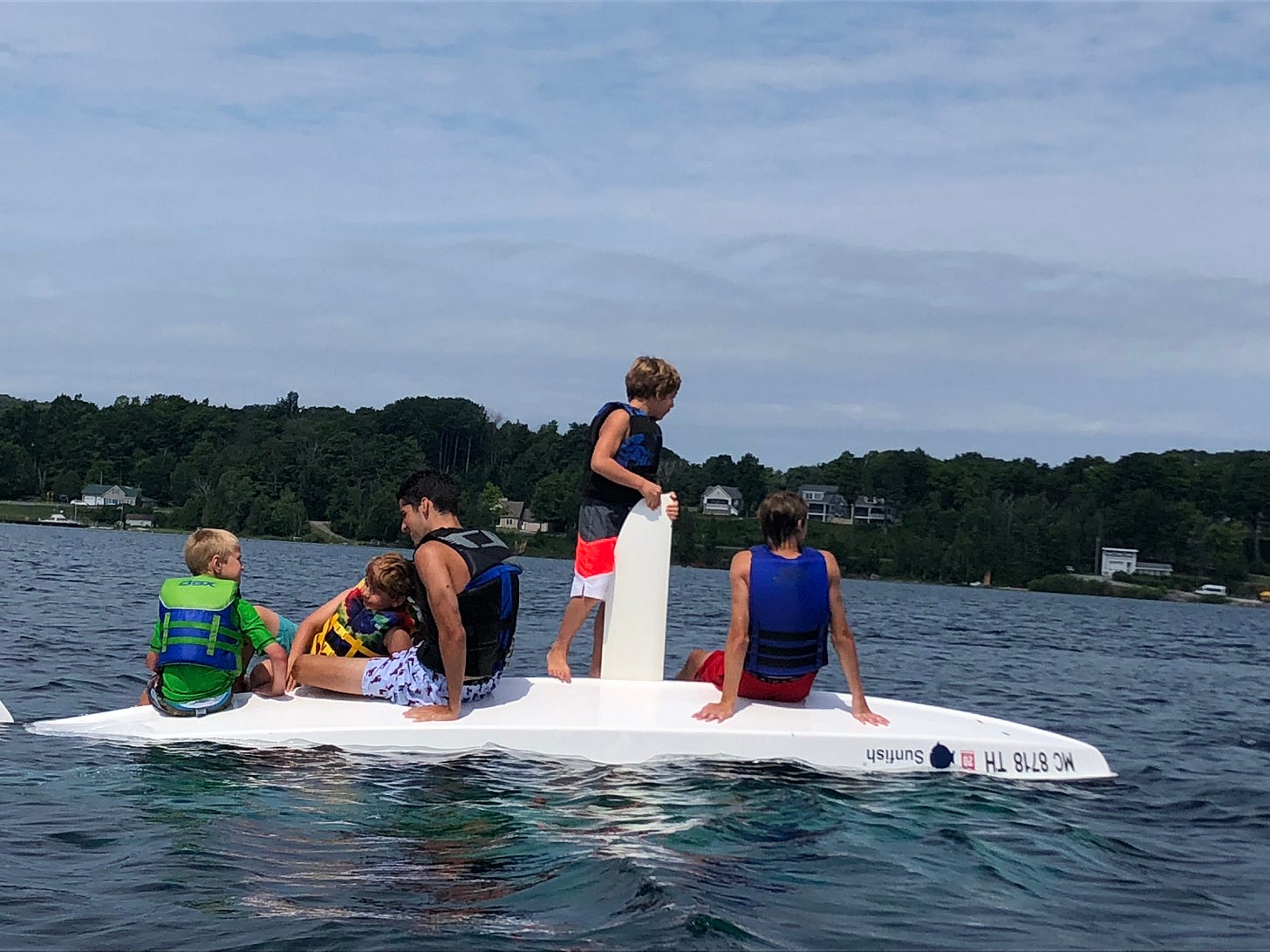
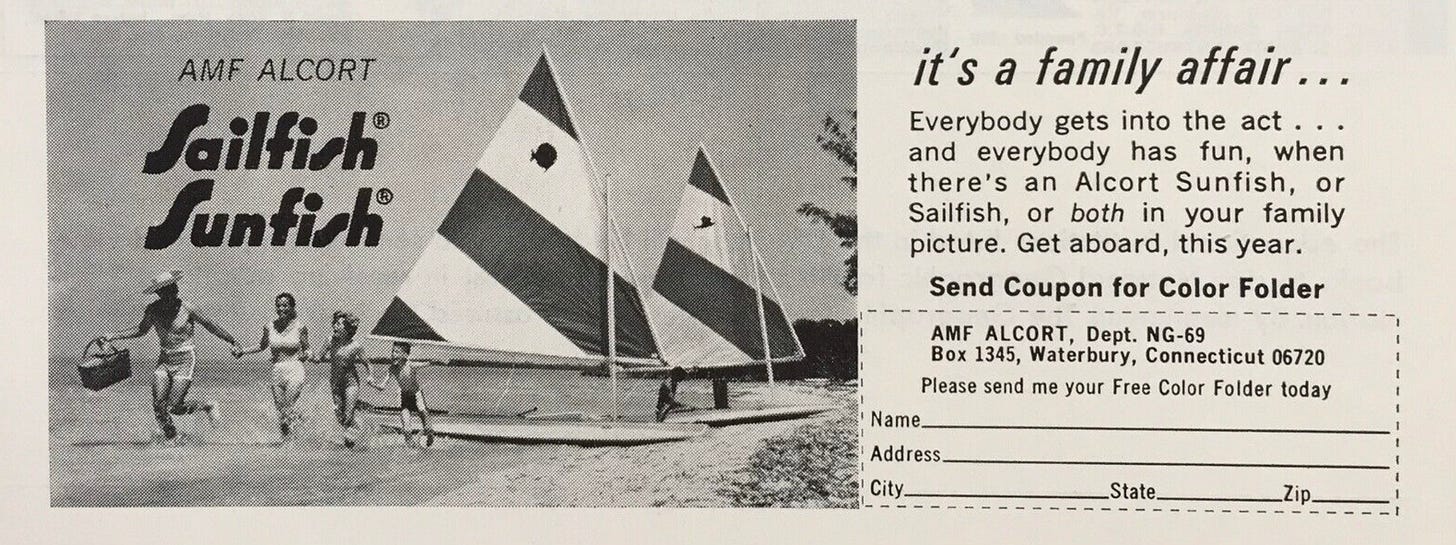
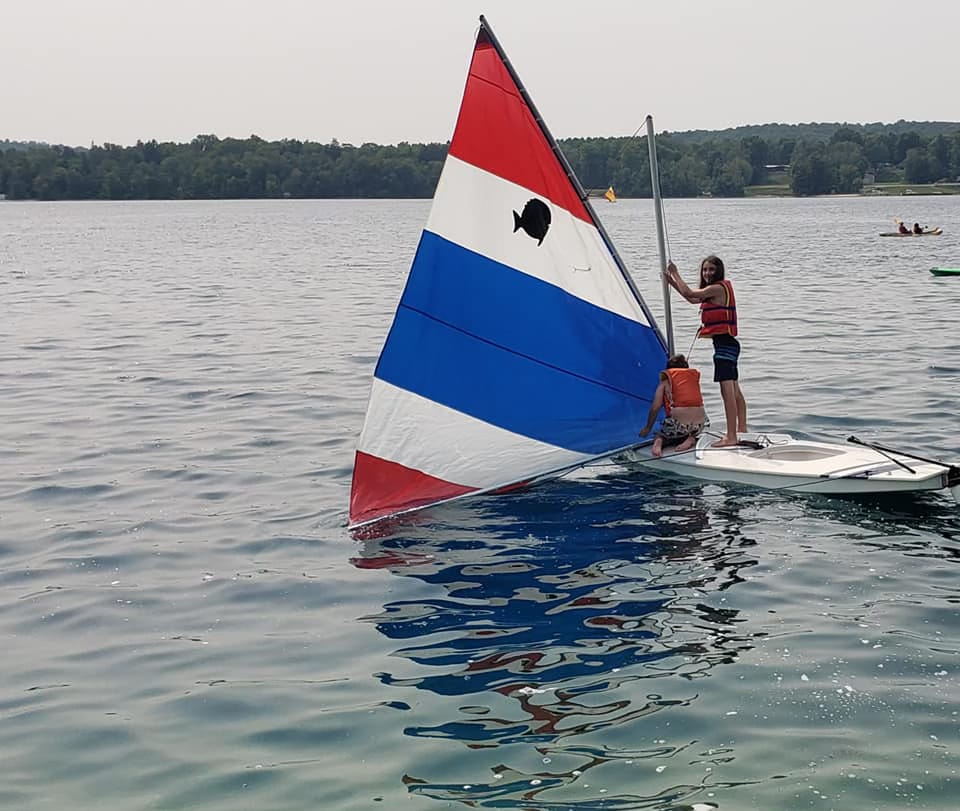
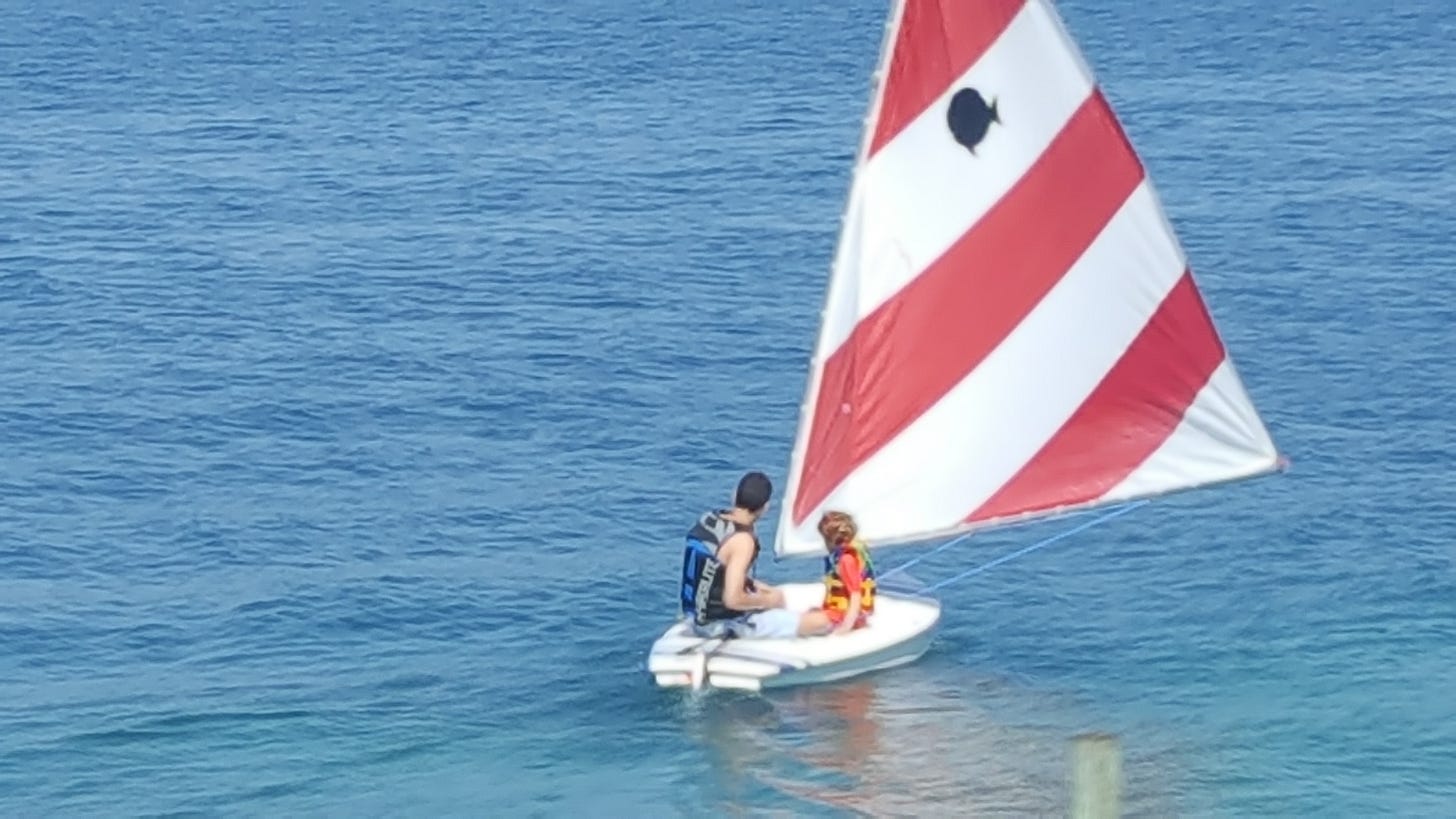
Love, love, love this! I feel like I was right there with you and Mark on the boat! So much fun reading this! Thanks Spitz Jr!
Wonderful.